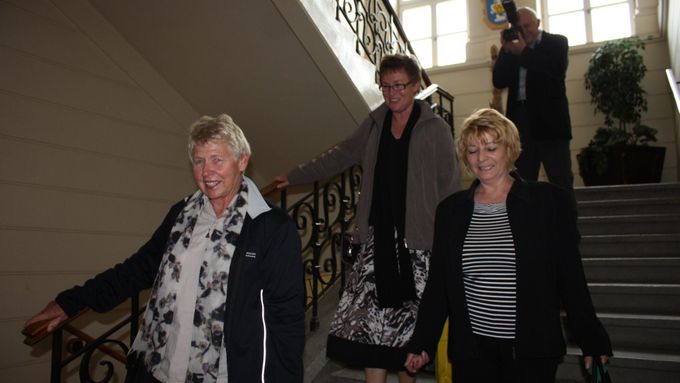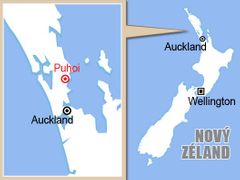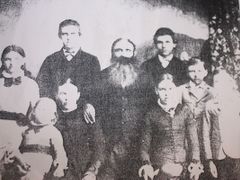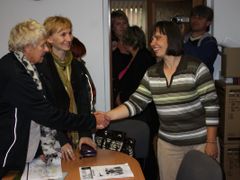Stod – Coming all the way from the other side of the planet and speaking no Czech, her search for family roots and possibly some living relatives in the Czech Republic reminded Barbara Straka of the adventures once experienced by her predecessors.
"It feels a bit like when my family came to New Zealand in the 19th century – everything is new and unfamiliar, yet interesting," says Barbara, whose great-grandfather emigrated from western Bohemia to New Zealand in 1863.
The New Zealand Dream
The government in New Zealand back then lured European settlers by giving each adult newcomer 16 hectares of fertile land, while minors received half of that.
A group of 82 German-speaking Czechs from the village of Stod, south of Plzeň, learned about the programme from a letter sent by Martin Krippner, a Czech émigré already settled in New Zealand.
Poverty, lack of affordable land as well as religious tensions within the Austro-Hungarian Empire prompted many to leave their motherland and never see it again.
The travel costs swallowed all their savings and most of the group had to borrow money for the trip. Sailing to New Zealand was much more expensive than to America, where most emigrants headed at that time, says Luděk Hauptmann in his book on Stod history.
The group left Stod on 26 February 1863. They first took a train to Prague, where they received pre-travel blessings from Archbishop Friedrich Schwarzenberg. From there they travelled to Hamburg, where one couple got married. Then they sailed to London.
Tough journey, tough start
Emigrant ships bound for New Zealand were required to meet much higher quality standards than those going to America. Still, having no previous maritime experience, central Europeans had to show much resilience during the journey.
Dark cabins with poor ventilation and very primitive sanitation, a shortage of water and food, as well as seasickness that did not spare anyone, did not leave fond memories in the travellers. The Czech group did not like the fact that unmarried women, including their 14-year-old daughters, had to sleep in dedicated female dorms.
Another shock came on their arrival in Auckland. The town's wooden cabins and a smelly canal did not quite match their enthusiastic expectations. Yet, the biggest disillusionment was yet to come.
In his letters, Krippner somehow forgot to mention that most of the free land waiting for settlement was in the mountains and covered with impenetrable forests. Left in the middle of New Zealand's wilderness without appropriate tools, the Stod group at first faced starvation, and most of them would not have survived without help from the Māori.
Te Hemara, the chieftain of the local indigenous tribe, regularly visited the Bohemian settlement of Puhoi (Māori for "slow water"), founded some 50 km north of Auckland. Every time he brought a good supply of food with him. The Māori also taught the settlers to hunt and fish, to grow local crops and to build homes from the nikau palm trees.
Puhoi finally managed to support itself by producing charcoal. Paul Straka built a boat to transport charcoal and timber down to Auckland.
Back to the roots
Almost 150 years later, Paul Straka's great-granddaughter Barbara Straka, now aged 67, took a trip to the Czech Republic to look for her roots in the Stod area.
"I've always wanted to see where my great-grandfather came from," says Barbara, a co-owner of a small press distribution company back in New Zealand.
"This is the very first visit of a Puhoi resident here in Stod," said mayor Jiří Vlk, who personally welcomed Barbara at Stod town hall.
She also visited the nearby village of Honezovice, only to find out that most of the houses, including the native home of her great-grandfather, were destroyed during the Second World War. She hoped to at least find her predecessors' graves.
"It is quite possible that, as members of Czechoslovakia's German-speaking minority, the family registered as ethnic Germans, in which case their graves were probably destroyed after the war," says Honezovice deputy mayor Iva Fictumová. She adds that only graves of fallen soldiers were spared.
At the cemetery in nearby Hradec, Barbara found one such grave of a Georg Straka, killed during the First World War in Kursk. But Barbara's relative Georg Straka, grandfather of the emigrant Paul Straka, must have died around 1880.
Barbara is not too disappointed and savours even these little findings. She says the museum in Puhoi will be excited to receive any photos or other materials documenting the origins of the New Zealand village's Bohemian founders.
Editor's note: The author of this article, Naďa Straková, comes from the same area as the predecessors of Barbara Straka. Barbara got in touch with Naďa in search of her predessecors. Naďa then helped Barbara with her search and used the opportunity to write this story.



